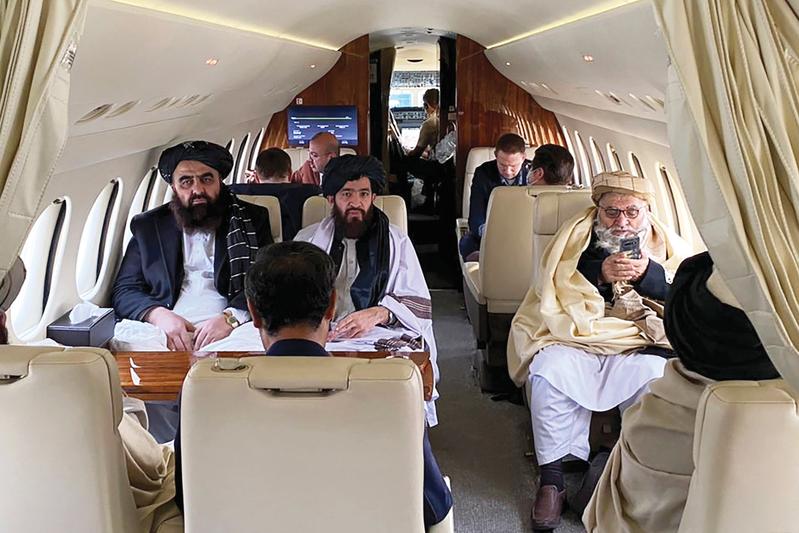 Taliban delegates prepare to depart for Oslo on Jan 22 for talks with Western diplomats. (AFGHAN TALIBAN / AFP)
Taliban delegates prepare to depart for Oslo on Jan 22 for talks with Western diplomats. (AFGHAN TALIBAN / AFP)
On their first visit to Europe since returning to power, the Taliban held landmark talks with Western diplomats in Oslo over the humanitarian crisis in Afghanistan, a meeting the Afghan delegation called an “achievement in itself”.
Having accepted an invitation from Norway, the Taliban met with representatives of the United States, France, the United Kingdom, Germany, Italy, the European Union and Norway on Jan 25, the final day of three-day closed-door discussions.
The Taliban delegation was led by Mullah Amir Khan Muttaqi, the country’s acting foreign minister, who hailed the meeting taking place as a success in its own right.
“Norway providing us this opportunity is an achievement in itself because we shared the stage with the world,” Muttaqi told reporters on Jan 24. “From these meetings we are sure of getting support for Afghanistan’s humanitarian, health and education sectors.”
Afghanistan’s humanitarian situation has deteriorated drastically since last August when international aid came to a sudden halt after the Taliban takeover, the fall of the US-backed government and the withdrawal of Western troops after 20 years of occupation.
Hunger now threatens 23 million Afghans, or 55 percent of the population, according to the United Nations, which says it needs $4.4 billion this year to address the crisis.
No country has yet recognized the Taliban government, which hopes that meetings of this kind will help legitimize them, experts have said.
Norway’s Foreign Minister Anniken Huitfeldt stressed that the talks would “not represent a legitimization or recognition of the Taliban”, but said because of the humanitarian emergency “we must talk to the de facto authorities in the country”.
Meanwhile, Taliban spokesman Zabihullah Mujahid tweeted after the talks that “the participants recognized that understanding and joint cooperation are the only solutions”.
Faced with the Taliban’s request that nearly $10 billion in assets frozen by the US and other Western countries be released, Western powers have put the rights of women and girls in Afghanistan high on their agenda, along with the West’s recurring demand for the Taliban administration to share power with Afghanistan’s minority ethnic and religious groups.
The caretaker government has called on the international community to formally recognize the Taliban administration. Mullah Hassan Akhund, its acting prime minister, made his first major public appearance at an economic conference in Kabul on Jan 19 since he assumed the role in September.
Muttaqi has said that the Taliban government welcomes “leading international companies, governments and investors to invest in various sectors of Afghanistan”.
Salman Bashir, former foreign secretary of Pakistan, said peace and stability at home and good cooperative relations with the international community, particularly with its immediate neighbors, are essential for starting the process of rebuilding Afghanistan.
“This requires a high degree of maturity by the Taliban government. Developing a solid national consensus within Afghanistan by providing all segments of the Afghan society an opportunity to participate in evolving such a consensus should be a priority,” he said.
“The neighbors and the international community must also be assured that the Taliban government will not permit the soil of Afghanistan to be used for terrorism. It is on this basis that the international community will be inclined to support the Taliban government.”
Amina Khan, director of the Centre for Afghanistan, Middle East and Africa at the Institute of Strategic Studies Islamabad in Pakistan, pointed out that the international community is already engaging with the Taliban.
However, she also thinks that the focus has now shifted toward human rights and women’s rights and education. An understanding between the Taliban and the international community clearly exists, “provided that the Taliban adhere to those pledges of reforms that they have talked about such as human, women rights and of course, the counterterrorism assurances”, Khan said.
Engagement and cooperation “will eventually imply (a move) toward recognition”, said Bashir. “For now, engagement and cooperation with the Taliban government by the international community is important. Everyone should help Afghanistan in becoming a normal state.”
Agencies and Xinhua contributed to this story.


